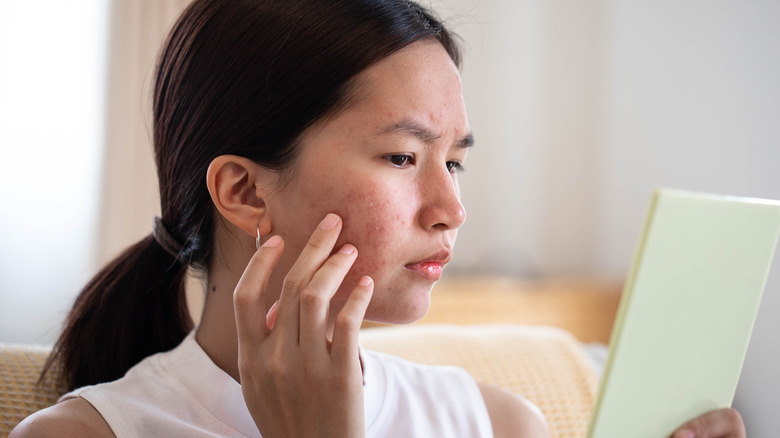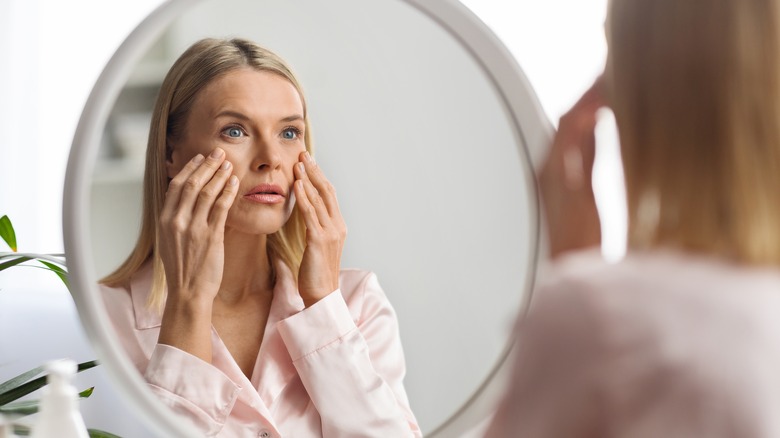Why Peanut Butter May Cause Skin Issues (Including Acne)
Whether you like your peanut butter creamy or chunky, this popular sandwich spread contains a delightful array of nutrients. A two-tablespoon serving (32 grams) of peanut butter contains 8 grams of protein to help build and repair cells and aid in the production of enzymes and hormones. It also provides 3 grams of fiber to help keep your digestive tract operating smoothly and 12.3 grams of unsaturated fats to help maintain a healthy cardiovascular system. In addition, it's a rich source of vitamin E, niacin, manganese, vitamin B6, and magnesium.
So, with all this nutritional goodness, what's not to love about peanut butter? Well, if you're not keeping an eye on the added ingredients and your overall nutritional intake, there could be plenty, including problems with your skin like acne and premature aging.
Peanut butter may cause acne breakouts
One potential reason that peanut butter might cause your face to fill with pimples lies not in the peanut butter itself, but in the heavy amounts of sugar that some brands contain. While natural peanut butter is low on the GI index with a GI of only 14, the situation changes when sugar is added to the product. According to the American Academy of Dermatology Association, higher GI foods can cause blood sugar spikes. This in turn can lead to systemic inflammation, causing you to produce more sebum, the oily substance that protects and hydrates your skin. Having too much sebum can lead to clogged pores and acne breakouts.
According to Curology, another factor that might contribute to the development of acne is the fact that peanut butter is high in omega-6 fatty acids. While these essential fatty acids play several vital roles in the human body, for example stimulating skin and hair growth, problems can arise when they are not in balance with omega-3 fatty acids or there is too much omega-6. This can lead to inflammation throughout the body. Mount Sinai advises seeking a healthy 1:2 to 1:4 balance of omega-3 and omega-6 by eating a diet like the Mediterranean diet that keeps meat consumption low while emphasizing whole grains, fruits, vegetables, fish, olive oil, garlic, and moderate wine consumption.
Peanut butter may also age your skin
If you're not already convinced about keeping your peanut butter free of added sugar, then consider the fact that sugar is also associated with premature aging. Dr. Andrew Nish, MD, told UnityPoint Health that sugar can age us both internally and externally, including our skin.
Nish likened what happens to leaving a peeled banana out on the counter. "What's happening is the sugars in that banana are reacting with proteins, causing cross-linking and the brown color (browning reaction)." According to Nish, this same sort of reaction happens in our bodies. "We're browning from the inside out," he said. The doctor further explained that sugar causes cross-linking of collagen, which makes our skin become stiff and less elastic. The result? Wrinkles, sagging, dark spots, and slower wound healing.
To maintain the health of your skin as well as the rest of your body, the Dietary Guidelines for Americans, 2020-2025 suggests limiting added sugars to less than 10% of calories. For a person eating a 2,000-calorie diet, this would equate to 200 calories or about 12 teaspoons of sugar. Added sugars include sucrose, dextrose, table sugar, syrups, honey, and sugars from concentrated fruit or vegetable juices, states the U.S. Centers for Disease Control and Prevention (CDC).


